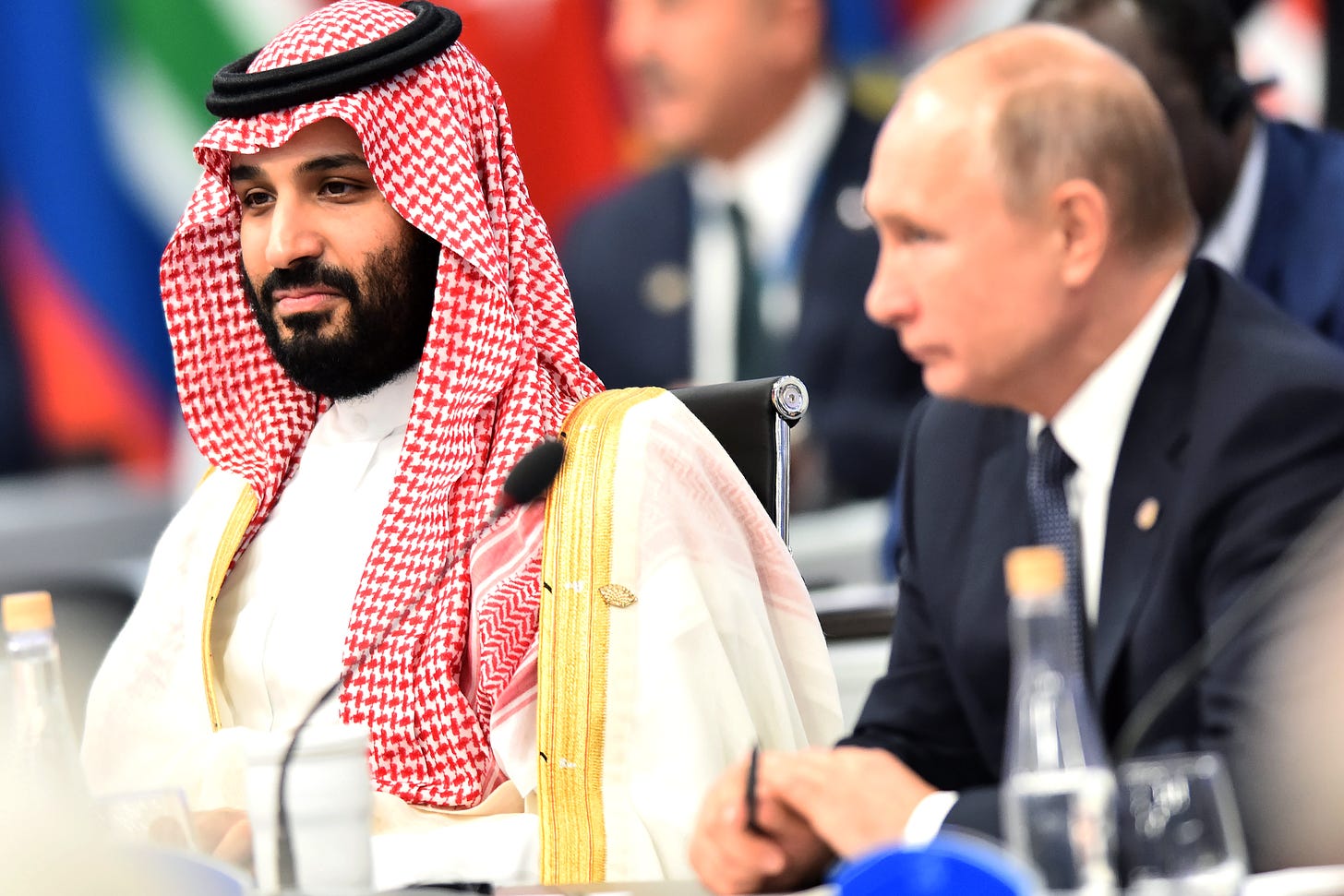
The news today that Saudi Arabia and other Gulf states are slashing oil production is a boon for Russia and a slap in the face of the United States. And especially President Biden. It is the result of a dysfunctional relationship long in the making. And it ushers in a new era of America’s interactions with the Middle East.
Gas prices will likely rise, just in time for the midterm elections. Was this the point? It doesn’t take a conspiracy theorist to start putting some troubling pieces together.
You have a regime in Riyadh that was chummy with Donald Trump and his inner circle, especially son-in-law Jared Kushner, with whom the Saudis “invested” $2 billion. And let’s be clear, nobody who is actually looking for a return on their investment would invest in Jared. What was that really about?
The Saudis are led by Mohammed bin Salman, a young autocrat with a reputation for ruthlessness, whose treatment of his own people is marked by atrocious human rights abuses. U.S. intelligence says he personally gave the go-ahead for the brutal murder of Jamal Khashoggi, a Saudi journalist and critic of the regime who wrote for The Washington Post. What a “prince” (well, he’s technically a prince, but you get the point).
The Saudis have been forging stronger ties with Russia, which desperately wants higher energy prices to help it evade Western sanctions and put more pressure on the West to back away from support for Ukraine. So this move clearly reflects the triumph of Putin’s interests over America’s (again bringing us back to the specter of Trump).
Then there is the matter of the missing top secret documents Trump had at Mar-a-Lago. We have seen no proof that the Saudis are involved in that saga, but it’s understandable that so many conspiracy theories would revolve around such speculations.
After all, there is so much about America’s relationship with Saudi Arabia that is shady, and this is just what we know about.
One thing is certain: Saudi Arabia and the other Gulf states have made a very strong statement in rebuffing requests from the United States not to cut production at a perilous time for the world economy. You could try to use the vocabulary of diplomacy to put what happened into context. But another way of looking at it is that the United States sent a long text message to its supposed “friend” group in the Middle East imploring them not to do this and got in return a single emoji with a raised middle finger.
For decades, the United States has walked a tenuous line — dependent on Saudi crude (and happy for a bulwark against Iran) while overlooking a human rights record that is among the worst in the world.
Along the way, the U.S. saved the Saudis from Saddam Hussein and Iraq when they were severely threatened near the end of the last century. And more recently has been protecting them from Iran.
These dynamics offer a real-world example of realpolitik, a foreign policy based on a cost-benefit analysis measured in energy prices and the complexities of the Middle East instead of the values of freedom and democracy that the United States has long espoused. Critics who say all this talk of American values represents rank hypocrisy often have pointed to Saudi Arabia as example 1A.
So where do we go from here? One imagines that the Biden administration had to be planning for this contingency. The president traveled to Saudi Arabia in July to try to ward off the kind of action we saw today — a trip for which he was heavily criticized by those rightly outraged by the Kingdom’s atrocities. Now, that effort has obviously failed.
It is past time for a reckoning between the United States and Saudi Arabia, something that should have happened long ago — such as after 9/11 (15 of the 19 hijackers were Saudi). Any notion that the Faustian bargain we’ve forged with the Kingdom makes sense should be shattered by this latest development.
All options are now, or should be, on the table. Should we halt military sales to Saudi Arabia? Should we find ways to break up the power of OPEC? There is reporting from The Wall Street Journal that the Biden administration may be turning to Venezuela. What other pressure points can be exerted?
What is also clear is that we are seriously overdue to wean ourselves off of fossil fuels — for the sake of the planet, as well as our national and economic security. The Saudis have played their hand. Have they overplayed it? Perhaps they can ask their friend Vladimir how things are turning out.
Note: If you are not already a subscriber to our Steady newsletter, please consider joining us. And we always appreciate you sharing our content with others and leaving your thoughts in the comments.



I have always cringed at the fact that we've any kind of relationship with this backward society, where women are treated as chattel. It's maddening that we engage with them at all, and only because we gorge on fossil fuels. There has to be a different way to do this. For the planet's sake and for the sake of human rights.
Sever our dependance on middle east oil as soon as possible! Stop selling them weapons! They are two faced and cut throat ( literally).